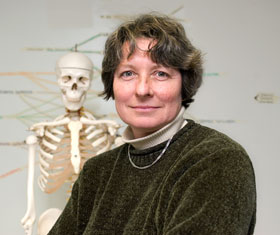  |
| HOME | THIS ISSUE | CALENDAR | PATENTS | BACK ISSUES | < BACK | NEXT > |
Soy not beneficial to bone health in women, says dietetics researcherby Sherry Fisher - February 26, 2007 | ||||
| Ah, the allure of soy. The little legume, touted as a “wonder food” that might fight heart disease, cancer, and osteoporosis, has stepped into the spotlight. Supermarket shelves are packed with items containing soy. There’s soy milk, cheese, yogurt, and a plethora of other products – even soaps and shampoos – that boast soy as a healthy ingredient. Consumers, always seeking quick fixes to improve their health, are buying lots of it. “There’s a lot of hype around soy, but the research hasn’t shown significant benefits,” says Jane Kerstetter, associate professor of dietetics. For the past decade, Kerstetter has been conducting research on how soy affects bone health in women. “There’s been a huge explosion in the number of women who are increasing their consumption of soy products in an effort to use ‘natural’ treatments for chronic diseases,” she says. “But our research has shown no beneficial effects of soy protein on calcium absorption and bone health. There’s even the potential for a slightly negative effect.” Her research was recently published in the Journal of Nutrition. Soy is a complex food containing a variety of compounds that can influence calcium homeostasis and skeletal balance, Kerstetter says. “Because they are relatively low in the sulfur-containing amino acids, soy proteins have been thought to be potentially beneficial to absorption of calcium.” The researchers evaluated the short-term effects of substituting soy protein for meat protein on calcium absorption and metabolism in healthy adult women. There are “surprisingly few studies that have investigated the effects of soy protein alone on calcium and bone metabolism,” Kerstetter notes. “We found that the substitution of soy protein for meat protein does not improve calcium economy, as originally hypothesized,” Kerstetter says. “If anything, the soy-induced changes could be interpreted as detrimental to calcium balance, in that there was a trend toward a decline in intestinal calcium absorption. Basically, we found that soy isn’t necessarily helpful to bones in calcium absorption and the way we metabolize it.”
She says that because including protein in the diet is an important regulator of calcium absorption, women who are substituting soy proteins for meat proteins may require an increase in dietary calcium and/or vitamin D to compensate for reduced bio-availability. In the randomized crossover study, 20 healthy women consumed four experimental diets: low-protein meat-based, high-protein meat-based, low-protein soy-based, and high-protein soy-based. “We compared how subjects’ calcium metabolism changed with each treatment,” Kerstetter says. Soy powder was added to cereal, juice, or soup. Blood and urine tests determined bone activity. The data indicated that when soy protein is substituted for meat protein, there’s a decline in calcium absorption. “This is a strong study,” she says. “These were healthy women who ingested tightly controlled metabolic diets. We found no beneficial effects of soy protein on calcium, and even the potential for a slightly negative effect.” She adds, “Women who drink a lot of soy milk, eat a lot of tofu, tempeh, or any other soy product might do well to increase calcium absorption concurrently, with a calcium supplement.” Does soy have any health benefits? “The results of studies have been inconsistent at best,” Kerstetter says. “There’s a certain romance that people have about soy. Soybeans are almost a religion. People have beliefs and ideas and the marketing is heavy. But it’s just a bean.” |
| ADVANCE HOME UCONN HOME |

